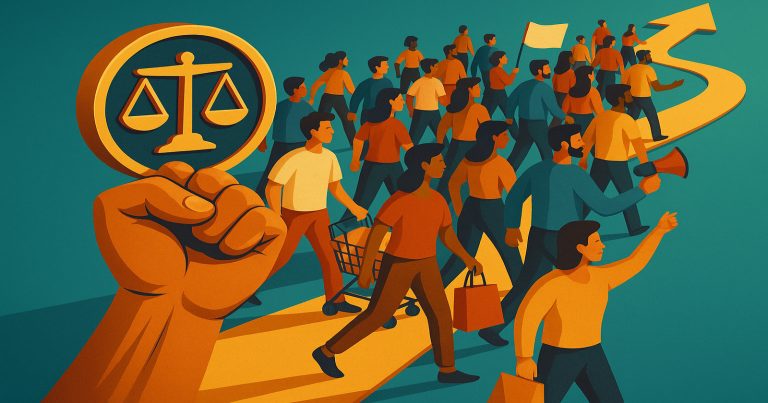The movement of consumers is a major social initiative for protecting their rights and providing them with fair and ethical practices in the marketplace. The consumer movement is a tool that empowers individuals through educating them about their rights and raising awareness about abusive practices as well as advocating for the establishment of strong legal frameworks. Whether local or international, consumers have been experiencing fraudulent advertising, poor quality products, and unfair prices. The movement ensures that no co-product is powerless; the consumer movement empowers consumers to make informed choices, demand quality from businesses, and seek redress where their rights have been infringed upon. The discussion herein will also dwell on the meaning, key aspects, functions, and impacts of the consumer movement, focusing on its relevance, particularly in India.
Consumer Movement and Why It Matters?
It is the action combined by consumers, organizations, and governments that pursues consumers’ interests as well as the safeguarding and advocacy of those rights. Consumer activism protested against inhumane exploitation, bad marketing practices, and substandard products in several industries. It has evolved over the years into very vigorous global movements affecting legislation, accounting, and empowering individuals. In the Indian context, consumerism momentum gained after enacting the Consumer Protection Act, 1986, establishing consumer-oriented governance.
Definition of Consumer Movement
Consumer movement is a social and legal initiative to prevent sellers from exploiting buyers, promote just trade, and ensure that buyers get good value for their money. It fights against false advertising, inferior products, and a lack of transparency in business transactions.
Goals of the Consumer Movement
The movement envisions a safe and just marketplace with enlightened, protected, and heard consumers who hold businesses accountable and socially responsible. It expects to create a larger scenario for trust between consumers and sellers.
Evolution of Consumer Movement in India
The consumer movement in India began gaining strength in the 1980’s, when the public became aware of what was happening and where legal interventions began. The Consumer Protection Act of 1986 and then the Consumer Protection Act of 2019 gave tooth to the movement through statutory provisions. As the consumer groups, NGOs, and digital platforms have bolstered the movement further, they have created a scenario that establishes the importance of television in shaping an audience’s perception against gender stereotypes.

Why Consumer Awareness Is Important?
Consumers are susceptible to fraud, overpricing, and selling substandard goods. The movement emphasizes the right to information and safety so consumers can make wiser choices and hold parties accountable.
Global Relevance of Consumer Rights
In this context of global competition, consumers’ movements are no longer confined to one country. Unsafe or unethical operations in one region affect buyers across the globe. Hence, consumer rights have become an international issue, with country laws and organizations worldwide supporting such movements.
Key Factors Behind the Emergence of the Consumer Movement
Many social, economic, legal, and global factors have culminated in the rise of the consumer movement, and they continue to define its evolution and retain relevance in an ever-changing marketplace. This post discusses these factors in detail.
Economic Factors
The mass production and commercialization of many products with minimal quality checks did not allow the market to grow further without unethical pricing and misleading advertisements. It became manifest to consumers that they collectively needed to protect themselves from exploitation.
Social Awareness
Thanks to the education and media boom, consumer rights are much more prominent in the public mind. People are now more aware of unfair trade practices, defective goods, and fraudulent advertisements. Public-interest litigation, media activism, and awareness campaigns have strengthened this momentum.
Legal Help
Legal enactment has given tremendous push to consumer rights. The 1986 Consumer Protection Act was a landmark piece of legislation in India, upon which consumer courts and the system of legal redress were established. The Consumer Protection Act, 2019, modified this law, covering areas such as e-commerce and product liability.
Globalization
Along with globalization comes the influx of foreign goods, international trade, and a digital market. Not only did this give rise to a lot of choice for consumers, but it also came with many risks, like poor-quality imports, counterfeit products, and challenges regarding jurisdiction. This global exposure, therefore, necessitated a more urgent and wide-reaching consumer movement.
Consumer Advocacy Groups
Consumer advocacy is an important aspect of active groups like the Consumer Guidance Society of India (CGSI) and many other NGOs engaged in the consumer movement. These groups organize awareness campaigns, help individuals pursue legal cases in consumer courts, and lobby the government to enact stronger consumer laws, which brings the government closer to consumers and businesses.
Main Functions of the Consumer Movement in Society
The consumer movement has lots of educational, regulatory, legal, and advisory functions which create a marketplace where justice, transparency, and ethically sound business operations are emphasized.
Consumer Education and Awareness
One of the primary aims of the movement is to make the public aware of their rights and responsibilities, which include reading labels, price comparisons, and checking certification of products before making purchases, as well as filing complaints. Awareness not only protects the consumer from fraud but also helps him weight out options before making the correct decisions.
Consumer Rights
It works to protect the “Six Rights of Consumers”: the right to safety, information, choice, redressal, consumer education, and to be heard. These rights are the foundation of every legal structure that upholds consumers against exploitation.
Regulation of Business Practices
The consumer movement demands transparency in product labeling and ethical advertising. It questions the veracity of product claims and spotlights companies that deceive customers. Businesses must comply with safety standards and quality maintenance to survive competition.
Consumer Advocacy and Lobbying
Advocacy organizations and NGOs act as intermediaries between consumers and lawmakers. They fight for consumer rights and push for strict penalties, stiffer campaigns, and substantial market policy reforms or regulations.
Advocacy Organizations and NGOs
Advocacy organizations and NGOs serve as buffers between consumers and lawmakers, pleading on behalf of consumers for better laws, amendments to existing ones, more stringent penalties, and better implementation of these laws. Most of their campaigns are successful in turning the tide of policies and regulations in the market.
Dispute Resolution and Legal Aid
Several organizations assist consumers with complaints and demand legal remedies against various institutions. In addition, consumer courts, mediation centers, and helplines operate in this arc, helping journalists access justice at the least cost.
Why Is the Consumer Movement Very Important in Today’s Society?
Consumer movements have become more relevant at this juncture of international trade, digital commerce, and mass marketing. The consumer movement ensures that the profit-centered practices and manipulations in the market do not drown out the buyer’s voice. Here is how it relates.
Empowerment of Consumers
Consumer movement arms people with the tools and knowledge to challenge unfair practices. It develops a vigilant and informed base of consumers who can hold businesses accountable and exercise purchasing choices.
Better Standards of Product
People make purchasing choices and vary locally as consumers, and businesses are forced to enhance product quality, safety, and reliability. Examples are repeated product recalls, exposing the supply chain, and certification for quality in products immediately results
Economic Efficiency
A fair and transparent market brings healthy competition. As a result, such markets will have improved quality output and benefit from it. Competition puts innovation, efficiency, and economic growth in motion.
Better Regulatory Framework
Consumer movements often influence the drafting and, of course, the revision of laws. Consumer Protection Law-2019 has dealt with modern-day challenges like online fraud, e-commerce disputes, and influencer marketing, protecting ethical businesses.
Social Justice and Equality
Thus, it does not cast aside society’s marginalized and lesser-informed sections. It challenges discrimination and enforces access to basic goods and services, thereby safeguarding the dignity of consumers, irrespective of their income levels or geographical areas.
Consumer Movement FAQs
1. What is consumer movement?
It is a social movement that seeks to protect consumer rights, raise awareness, and ensure businesses operate ethically and responsibly.
2. What are the key factors behind the consumer movement?
Factors include economic exploitation, legal awareness, globalization, advocacy efforts, and rising social consciousness about consumer rights.
3. What are the primary functions of the consumer movement?
Functions include educating consumers, protecting their rights, regulating unethical business practices, advocating legal reforms, and offering dispute resolution.
4. How is the consumer movement evolving in India?
The movement in India has grown stronger with legal reforms like the Consumer Protection Act, 2019, increased digital literacy, and active consumer organizations.
5. Why is the consumer movement important today?
It ensures fairness, empowers buyers, protects significant populations, and promotes ethical market practices in an increasingly complex global economy.


